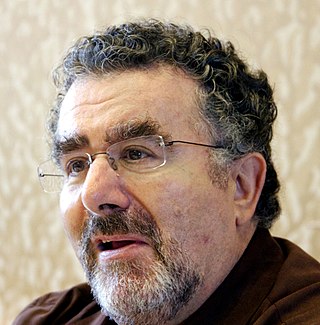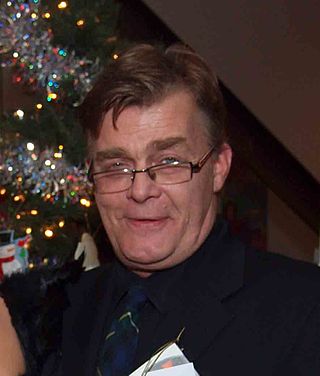Related Research Articles

Don McKellar is a Canadian actor, writer, playwright, and filmmaker. He was part of a loosely-affiliated group of filmmakers to emerge from Toronto known as the Toronto New Wave.

Saul Hersh Rubinek is a Canadian actor, director, producer, and playwright.

Nicholas Campbell is a Canadian actor and filmmaker. He is a four-time Gemini Award winner, a three-time Genie Award nominee, and a Canadian Screen Award nominee. He is known for his portrayal of the eponymous character, coroner Dominic Da Vinci, on the crime drama television series Da Vinci's Inquest (1998-2005) and its spin-off Da Vinci's City Hall (2005-2006).
Peter Lynch is a Canadian filmmaker, most noted as the director and writer of the documentary films Project Grizzly, The Herd and Cyberman.

Simcha Jacobovici is a Canadian-Israeli journalist, documentary filmmaker and pseudoarcheologist.
The 19th Genie Awards were held, by the Academy of Canadian Cinema & Television, on February 4, 1999 to honour Canadian films released in 1998. It marked only the second time in the 1990s, after the 16th Genie Awards in January 1996, that the awards were held in the winter of the year following the year in which eligible films were released, rather than the late fall of the same year; the awards have since retained the winter scheduling. The ceremony was once again aired on CBC Television, and a post-event highlights show aired on Radio Canada.
The Academy of Canadian Cinema and Television presents an annual award for Best Motion Picture to the best Canadian film of the year.
The Academy of Canadian Cinema and Television presents an annual award for Best Achievement in Cinematography, to honour the best Canadian film cinematography.
The Canadian Screen Award for Best Animated Short is awarded by the Academy of Canadian Cinema and Television to the best Canadian animated short film. Formerly part of the Genie Awards, since 2012 it has been presented as part of the Canadian Screen Awards.
The Canadian Screen Award for Best Live Action Short Drama is awarded by the Academy of Canadian Cinema and Television to the best Canadian live action short film. Formerly part of the Genie Awards, since 2012 it has been presented as part of the Canadian Screen Awards.
Colleen Louise Murphy is a Canadian screenwriter, film director and playwright. She is best known for works including her plays The December Man, which won the Governor General's Award for English-language drama at the 2007 Governor General's Awards, and Beating Heart Cadaver, which was a shortlisted nominee for the same award at the 1999 Governor General's Awards, and the film Termini Station, for which she garnered a Genie Award nomination for Best Original Screenplay at the 11th Genie Awards.
The Academy of Canadian Cinema and Television presents an annual award for Best Feature Length Documentary. First presented in 1968 as part of the Canadian Film Awards, it became part of the Genie Awards in 1980 and the contemporary Canadian Screen Awards in 2013.
The Academy of Canadian Cinema and Television's Award for Best Short Documentary is an annual Canadian film award, presented to a film judged to be the year's best short documentary film. Prior to 2012 the award was presented as part of the Genie Awards program; since 2012 it has been presented as part of the expanded Canadian Screen Awards.
Moving Day is a Canadian comedy short film, directed by Chris Deacon and released in 1998. The film stars Michael McMurtry and Brigitte Gall as Scott and Amy, a couple who are moving in together for the first time, but must cope with relationship anxieties when the process reveals aspects of their personalities that they didn't previously know about each other.
Calling the Shots is a Canadian documentary film, directed by Janis Cole and Holly Dale and released in 1988. The film analyzes the changing role of women in the film industry, through the reflections of various female performers and filmmakers.
The World Is Watching is a Canadian short documentary film, directed by Peter Raymont and released in 1988. The film examines media coverage of the Nicaraguan Revolution through the lens of an ABC News crew on the ground in the country, documenting the various production pressures and limitations that can hamper the efforts of journalists to fully and accurately report a story; its thesis hinges in part on the fact that Nicaraguan president Daniel Ortega's key announcement that he would negotiate with the Contras was made only after the network's news production deadline for the day, leaving the network's initial reports on ABC World News Tonight able to report that he had made a speech but almost completely unable to say anything informative about it.
Tops & Bottoms: Sex, Power and Sadomasochism is a Canadian documentary film, directed by Cristine Richey and released in 1999. The film depicts the BDSM subculture, most notably through the relationship of BDSM enthusiast couple Robert and Mary Dante.
The Herd is a Canadian documentary film, directed by Peter Lynch and released in 1998. The film documents the history of the Canadian government's failed Reindeer Station project of 1929, when it attempted to transport a herd of reindeer from Alaska to the Mackenzie River delta in the Northwest Territories.
Let It Come Down: The Life of Paul Bowles is a Canadian documentary film, directed by Jennifer Baichwal and released in 1998. The film is a portrait of American writer and composer Paul Bowles.
Erotica: A Journey Into Female Sexuality is a Canadian documentary film, directed by Maya Gallus and released in 1997. The film explores the perspectives on sexuality of various women involved in the production and release of both heterosexual and lesbian erotica and pornography, including performance artist Annie Sprinkle, filmmaker Candida Royalle, writers Susie Bright and Catherine Robbe-Grillet, photographer Bettina Rheims and novelist Anne Desclos. The film was the last interview Desclos gave during her lifetime.
References
- 1 2 Leslie Scrivener, "'Coincidences' cited in quest for lost tribes; Lost tribes in India, China, Uzbekistan, Afghanistan visited in filmmaker's quest". Toronto Star , May 30, 1999.
- 1 2 Lila Sarick, "Descendants alive today, filmmaker says: Among Western adventurers, the search for the lost tribes of Israel has long rivalled quest for the Holy Grail and Ark of the Covenant". The Globe and Mail , November 20, 1998.
- ↑ "Documentaries examine Holy Land". Toronto Star , April 4, 2000.
- ↑ "Genie Award nominations". Toronto Star , December 8, 1999.